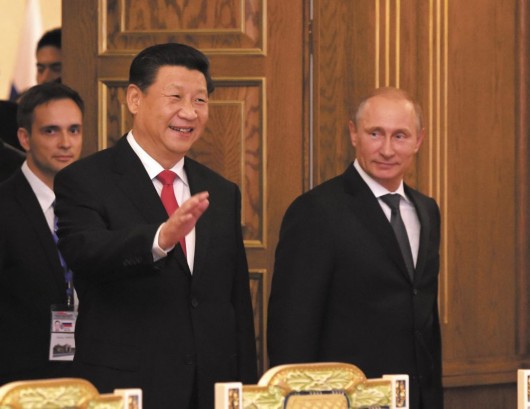

 |
| Chinese President Xi Jinping and Russian President Vladimir Putin in in Dushanbe, capital of Tajikistan in September, 2014.(File photo) |
On May 5th, 2015, China's Foreign Ministry announced that President Xi Jinping will attend celebrations marking the 70th anniversary of the victory of the Great Patriotic War to be held in Moscow, and visit Russia from May 8 to 10. Moreover, Xi is also expected to visit Kazakhstan on May 7 and Belarus from May 10 to 12.
Xi's future visit to these three nations shows that China remembers history, commemorates martyrs, cherishes peace, and wishes to create a bright future. This visit will also deepen China's cooperation with Russia, Kazakhstan and Belarus, inject new impetus to the construction of the Silk Road Economic Belt, and promote regional development.
According to Russian President Vladimir Putin, May 9 is the biggest and most glorious holiday in Russia. He adds that seventy years have passed since the end of the WWII, but Russians still hold keen feelings towards the victory, show respect towards the great spiritual power of the generation involved in WWII, and deem human life precious. Russia accomplished the final defeat of Nazi Germany at the cost of 27 million lives. Xi's attendance in the Victory Day commemoration in Moscow illustrates China's high respect for Russia's contribution to victory in WWII, and its determination to safeguard peace and create a bright future.
China and the Soviet Union made huge sacrifices to help ensure mutual victory during the WWII, and laid a solid foundation for generations of friendship between the two peoples. China was the main battlefield in Asia in WWII. While suffering from the longest and hardest struggle against the Japanese army, the Chinese kept the Japanese troops pinned down, sparing the army of the Soviet Union from having to fight on two fronts, and supporting the fight of the allied forces in the Pacific theatre. The Soviet Union also made a huge contribution to China's victories in the Anti-Japanese War. During the struggle, the Soviet Union sent more than 2,000 air force volunteers to join the air battles in Nanjing, Wuhan, Chongqing, Cheng Du and Lanzhou. More than 200 volunteers lost their lives in China. In the final stage of China's war against the Japanese army, the Soviet Union launched an offensive against the Japanese Kwantung army that left almost ten thousand Soviet Union soldiers dead in China.
China and Russia keep the development momentum of their all-round strategic partnership at a high level, and strengthen cooperation in terms of promoting common development and safeguarding global peace and stability. Xi's upcoming visit to Russia will inject new vigor into the development of China-Russian ties.
During his visit to Kazakhstan in September 2013, Xi proposed the Silk Road Economic Belt initiative for the first time. Xi is the first head of state to pay a visit to Kazakhstan since Nazarbayev was re-elected as president. In addition, China and Kazakhstan signed a series of cooperative agreements worth more than 10 billion U.S. dollars, creating a new model for China's pragmatic cooperation with other countries. During Xi's future visit to Kazakhstan, China and Pakistan will create a blueprint and coordinate their positions to promote mutually beneficial cooperation between the two countries.
It will be the first visit by a Chinese President to Belarus for 14 years. Xi's visit to Belarus will help the two countries create a top-down and comprehensive plan for the continuous development of bilateral ties, and strengthen their traditional friendship. Currently, bilateral ties have entered a crucial stage of rapid development. China helped Belarus build a heart surgery building and invited 200 children from the area hit by the Chernobyl disaster to China to recuperate here. All these efforts consolidate the social basis for bilateral ties.
This article was edited and translated from 《传递维护和平、共创未来的真诚意愿》,source: People's Daily
 J-11 fighters in air exercise
J-11 fighters in air exercise Beauties dancing on the rings
Beauties dancing on the rings Attendants-to-be join Mr. & Miss Campus Contest
Attendants-to-be join Mr. & Miss Campus Contest Beijing's toughest anti-smoking law takes effect
Beijing's toughest anti-smoking law takes effect Family lives in cave for about 50 years in SW China
Family lives in cave for about 50 years in SW China PLA soldiers operating vehicle-mounted guns in drill
PLA soldiers operating vehicle-mounted guns in drill Blind carpenter in E China's Jiangxi
Blind carpenter in E China's Jiangxi China hosts overseas disaster relief exercise for the first time
China hosts overseas disaster relief exercise for the first time 20 pairs of twins who will become flight attendants in Sichuan
20 pairs of twins who will become flight attendants in Sichuan Obama is sowing discontent in S.China Sea
Obama is sowing discontent in S.China Sea Rescuers work through night to reach cruise ship survivors
Rescuers work through night to reach cruise ship survivors Driving through limbo
Driving through limbo Facing down MERS
Facing down MERSDay|Week